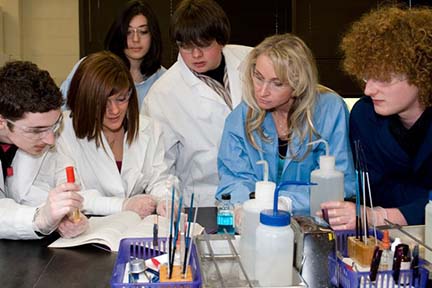
Gov. Whitmer Boosts Funding for 16 Schools to Expand Science, Technology, Engineering, and Math Programs to Prepare Students for In-Demand Jobs
LANSING, Mich. – Today, Governor Gretchen Whitmer along with state environmental and workforce leaders announced 16 K-12 institutions, school districts and educational partnerships have been awarded $205,028 to develop Great Lakes-based science, technology, engineering, and math (STEM) educational programs for students. These grants build on the Governor’s historic educational budget proposal, which includes the highest per-student investment ever, $1 billion for new school construction and renovation, funds to hire and retain 15,000 teachers, and more resources for on-campus mental health support.
“These grants will support freshwater literacy programs and offer students access to real world STEM experiences,” said Governor Whitmer. “Our Great Lakes are our greatest asset, and we must empower young Michiganders to learn more about them and continue advancing conservation efforts. Michigan’s economic competitiveness depends on a workforce proficient in STEM and committed to solving our biggest challenges. Investments like these will help prepare our kids to lead our state into the future.”
The grants, announced in connection with Michigan’s Great Lakes and Fresh Water Week, are a collaborative effort of the Michigan Department of Environment, Great Lakes, and Energy (EGLE) and the Michigan Department of Labor and Economic Opportunity’s (LEO) MiSTEM Network to expand freshwater literacy and place-based STEM education and to support innovative STEM 3-P (problem, place and project-based) learning.
“The Great Lakes State is investing in great leadership for our future,” said Liesl Clark, director of the Michigan Department of Environment, Great Lakes, and Energy. “These innovative educational programs and experiences will shape tomorrow’s advocates, policymakers and champions who will value and safeguard Michigan’s waterways and watersheds.”
“This continued partnership between EGLE and LEO supports students and educators through new and innovative approaches to STEM education to help close our state’s talent gap and prepare our students for high-demand career paths in STEM fields and beyond,” said Susan Corbin, director of the Michigan Department of Labor and Economic Opportunity. “We applaud these schools and community partners across the state for taking advantage of this grant opportunity and working with us to gear up today’s talent for the jobs of the future.”
Grant proposals were submitted and reviewed through a competitive request for proposal process. Projects were selected that best incorporated freshwater-focused efforts, place-based approaches and real-world experiences to engage students about the importance of Michigan’s Great Lakes and water resources and prepare them for careers in a variety of STEM fields.
|
|
$6,892 to expand 3-P learning across grades 6-7-8 using the lens of coastal and wetland habitats.
|
|
|
$8,078 to facilitate a program where students work as scientific researchers collecting data and making observations to determine if environmental issues are impacting the Thunder Bay River Watershed.
|
|
|
$5,000 for students to adopt two beaches in the township in partnership with the Alliance for the Great Lakes. Students and families will participate in science lessons, Earth Force Environmental Inventories and field trips that directly involve the land and beaches they have adopted and expose them to careers in science, engineering and natural resource management.
|
Atherton Community Schools
|
$10,000 to engage 195 middle and high school science students in 3-P learning through its “Health in Our Hands” curriculum, conduct three health summits, and provide professional learning for four middle and high school science teachers.
|
Charlevoix-Emmet Intermediate School District
|
$20,000 to institutionalize 3-P learning to schools across their ISD by supporting teachers, partnering with community and/or businesses and engaging students.
|
Farmington Public Schools
|
$15,870 to incorporate “student voice” in water steward topics and institutionalize 3-P teaching and learning in the district.
|
Forest Hills Central Woodlands 5/6 School
|
$20,000 to provide 3-P learning experiences for students including transportation for all students to visit the Inland Seas Schooner and engage in the remotely operated vehicle (ROV) program through Inland Seas Education Association.
|
Grand Rapids Montessori, Grand Rapids Public Schools
|
$8,862 to help students identify and begin solving the problem of habitat loss for local pollinators, bird and turtle species in the city through a partnership with educators at John Ball Zoo.
|
Harrington Elementary School
|
$12,000 for Marshall Public Schools to partner with Albion College to develop “outdoors at school” curricula for grades K-5 to be piloted at Harrington Elementary School including field trips to the college’s Whitehouse Nature Center.
|
Kalamazoo Regional Educational Service Agency
|
$20,000 to support Southwest MiSTEM and the Kalamazoo Nature Center to establish a Great Lakes Stewardship Initiative hub to continue water stewardship education programs like monitoring efforts on the Kalamazoo River.
|
Mt. Morris Consolidated Schools
|
Mt. Morris Middle School – $15,000 to continue participation in the Flint River Green project. This student-led endeavor invites students to learn about the Flint River Watershed and its community impact through a partnership with a civil engineer from the Genesee County Drain Commission.
|
Muskegon Area Intermediate School District
|
$15,000 to support the expansion and institutionalization of 3-P learning for 420 fourth grade students and 3-P training for 19 fourth grade teachers in partnership Orchard View Schools and Reese-Puffer Schools.
|
|
|
$9,996 to allow students to continue gathering water quality data from the local watershed using the data sensors deployed during the current school year through the MiWaterNet initiative.
|
Stanton Township Public Schools
|
$5,000 to train new teachers to carry out future Lake Superior Stewardship Initiative activities and to sustain student undertakings with the Stanton Township Schools’ gardens.
|
Washtenaw Intermediate School District
|
$20,000 to build a foundation for cross-district collaboration in support of freshwater-focused place-based education among teacher teams in southeast Michigan.
|
Wayne-Westland Community Schools
|
$13,330 to implement a rigorous, community-centered 3-P learning program which will allow students to begin to see themselves as scientists, innovators, mathematicians, readers and writers.
|
From Students to Stewards was launched to teach students about the Great Lakes, Michigan watersheds and the impact people have on water resources. The program integrates water literacy principles into place-based education and STEM learning across all grade levels to engage students.
The Importance of Michigan’s Great Lakes
The Great Lakes and Michigan’s abundant freshwater resources have tremendous value to Michiganders. Michigan is home to more than 3,200 miles of coastline along four Great Lakes, 11,000 inland lakes and ponds, 36,000 miles of rivers and streams, and enough groundwater to fill Lake Michigan over again. More than 30 million people in the U.S. and Canada rely on the Great Lakes for their drinking water.
Michigan has the potential to become a world leader in STEM education and careers, due to strong talent, educational institutions and thriving industries. According to the federal Bureau of Labor Statistics, STEM careers had median wages in 2020 that were more than double that of non-STEM occupations. These careers are expected to grow at more than twice the rate of other occupations in the upcoming years. Michigan has the 4th largest engineering, design and development (EDD) workforce in the nation, with over 113,000 employed in related industries in 2020. Employment in EDD industries is almost twice as concentrated in Michigan as the national average.
Governor Whitmer’s Education Investments
For three years straight, Governor Whitmer has worked across the aisle to make the largest education investments in Michigan history—without raising taxes. Since taking office, she’s tripled the number of literacy coaches and last year, she signed an education budget that closed the funding gap between schools, boosted per-student investment to an all-time high, and helped districts hire hundreds of on-campus mental health professionals. The Whitmer-Gilchrist administration’s education accomplishments can be found here.
|













